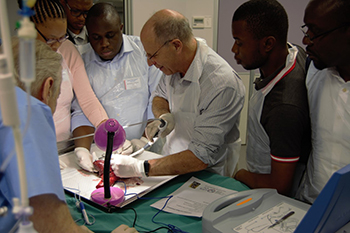Latest News Archive
Please select Category, Year, and then Month to display items
05 June 2018
Photo Supplied
 Archaeological excavations in the Wonderwerk Cave, north of Kuruman in the Northern Cape.
Archaeological excavations in the Wonderwerk Cave, north of Kuruman in the Northern Cape.
Research fellow Dr Lloyd Rossouw from the Department of Plant Sciences at the University of the Free State (UFS) recently published an article in the Nature Ecology and Evolution journal with Dr Michaela Ecker from the University of Toronto as lead author, and Dr James Brink, research fellow at the UFS Centre for Environmental Management. The findings described in “The palaeoecological context of the Oldowan-Acheulean in southern Africa” provides the first extensive paleoenvironmental sequence for the interior of southern Africa by applying a combination of methods for environmental reconstruction at Wonderwerk Cave, which have yielded multiple evidence of early human occupation dating back almost two million years ago.
Where water once was
The Wonderwerk Cave is found north of the Kuruman hills (situated in Northern Cape) a 140m long tube with a low ceiling. The surroundings are harsh. Semi-arid conditions allow for the survival of only hardy bushes, trees, and grasses. But during the Early Pleistocene, stepping out of the Wonderwerk Cave you would have been greeted by a completely different site, the researchers found. Using carbon and oxygen stable isotope analysis on the teeth of herbivores (Dr Ecker), fossil faunal abundance (Dr Brink), as well as the analysis of microscopic plant silica remains (phytoliths) excavated from fossil soils inside the cave (Dr Rossouw), the results show that ancient environments in the central interior of southern Africa were significantly wetter and housed a plant community unlike any other in the modern African savanna.
What difference does it make?
While East African research shows increasing aridity and the spread of summer-rainfall grasslands more than a million years ago, the results from this study indicate an interesting twist. During the same period, shifts in rainfall seasonality allowed for alternating summer and winter-rainfall grass occurrences coupled with prolonged wetlands, that remained major components of Early Pleistocene (more or less the period between one and two million years ago) environments in the central interior of southern Africa. That means our human ancestors were also living and evolving in environments other than the generally accepted open, arid grassland model.
Great turnout for Hannes Meyer Symposium in Cardiothoracic Surgery
2017-05-05

Symposium attendees watch attentively as
Dr Johan Brink demonstrated a MAZE procedure
with a pig’s heart.
Photo: Supplied
The University of the Free State’s Faculty of Health Sciences hosted the annual Hannes Meyer Symposium in Cardiothoracic Surgery. The symposium was organised by Prof Francis Smit, head of the department of Cardiothoracic Surgery at the UFS, with the support from the Society of Cardiothoracic Surgeons of South Africa and the European Association of Cardiothoracic Surgery (EACTS). Over the past 16 years this symposium has steadily been growing in stature and prestige leading to the resounding success that was this year’s event.
Medical advancements explored
The aim of the symposium is to provide an overview of the latest advances in Cardiothoracic Surgery and perfusion as well as providing hands-on training via simulation to trainees from South Africa and the rest of the African continent. Didactic lectures and papers by registrars were an integral component of the symposium. The South African community was represented by various heads of departments, trainees, senior specialists and perfusionists from all the training centres in the country. There were also delegates representing Uganda, Mozambique, Nigeria and Zambia.
Heart surgery off to new heights
Simulation in Cardiothoracic Surgery and Perfusion can be compared to airline pilots with high risk, with complex surgeries being first done in simulators before being attempted in the real world. The UFS is proud to have a state-of-the-art simulation facility, which was used to facilitate the programme.
The range of simulation was extensive and included simple procedural models to complex full theatre setups with Human Performance Models in perfusion that simulated crisis scenarios with the aid of computerised devices that react in real time to human intervention.
Industry support highly appreciated
This event was coordinated by Dr Jehron Pillay, senior registrar in the Department of Cardiothoracic Surgery and Marilee Janse van Vuuren, deputy-director clinical technology, in the department. This was the first time that such extensive simulation models were used in the programme and judging from the positive response received, it has certainly set the benchmark for all future events.
The event has received invaluable support over the years from EACTS that has selected Bloemfontein as the site of its African training programme as a result of the high level of training and education achieved here.
The academic discussions were chaired by Profs Marko Turina and Jose Pomar (past presidents of EACTS) and Pieter Kappetein (past secretary general of EACTS) who are extremely well known internationally for their contribution to advancing Cardiothoracic training and education.
Our guests from EACTS presented didactical lectures on research methodology, international randomised trials and discussed recent developments and controversies in cardiothoracic surgery.
Registrars from all South African units presented a thoracic and cardiac surgery paper from each unit highlighting specific disease conditions, moderated by heads of departments and the international panel.
An event of this magnitude requires significant financial support and the medical industry in South Africa stepped up to the plate in providing financial and logistical support in order to make it possible.